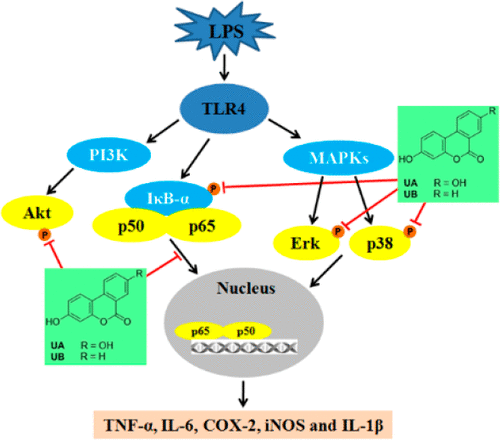当前位置:
X-MOL 学术
›
J. Agric. Food Chem.
›
论文详情
Our official English website, www.x-mol.net, welcomes your feedback! (Note: you will need to create a separate account there.)
Urolithins Attenuate LPS-Induced Neuroinflammation in BV2Microglia via MAPK, Akt, and NF-κB Signaling Pathways
Journal of Agricultural and Food Chemistry ( IF 6.1 ) Pub Date : 2018-01-16 00:00:00 , DOI: 10.1021/acs.jafc.7b03285 Jialin Xu 1, 2 , Chunhui Yuan 1 , Guihua Wang 1 , Jiaming Luo 1 , Hang Ma 3 , Li Xu 1 , Yu Mu 1 , Yuanyuan Li 1 , Navindra P. Seeram 3 , Xueshi Huang 1 , Liya Li 1
Journal of Agricultural and Food Chemistry ( IF 6.1 ) Pub Date : 2018-01-16 00:00:00 , DOI: 10.1021/acs.jafc.7b03285 Jialin Xu 1, 2 , Chunhui Yuan 1 , Guihua Wang 1 , Jiaming Luo 1 , Hang Ma 3 , Li Xu 1 , Yu Mu 1 , Yuanyuan Li 1 , Navindra P. Seeram 3 , Xueshi Huang 1 , Liya Li 1
Affiliation

|
Emerging data suggest that urolithins, gut microbiota metabolites of ellagitannins, contribute toward multiple health benefits attributed to ellagitannin-rich foods, including walnuts, red raspberry, strawberry, and pomegranate. However, there is limited data on whether the potential neuroprotective effects of these ellagitannin-rich foods are mediated by urolithins. Herein, we evaluated the potential mechanisms of antineuroinflammatory effects of urolithins (urolithins A, B, and C; 8-methyl-O-urolithin A; and 8,9-dimethyl-O-urolithin C) in BV2 murine microglia in vitro. Nitrite analysis and qRT-PCR suggested that urolithins A and B reduced NO levels and suppressed mRNA levels of pro-inflammatory genes of TNF-α, IL-6, IL-1β, iNOS, and COX-2 in LPS-treated microglia. Western blot revealed that urolithins A and B decreased phosphorylation levels of Erk1/2, p38 MAPK, and Akt, prevented IκB-α phosphorylation and degradation, and inhibited NF-κB p65 subunit phosphorylation and nuclear translocation in LPS-stimulated microglia. Our results indicated that urolithins A and B attenuated LPS-induced inflammation in BV2 microglia, which may be mediated by inhibiting NF-κB, MAPKs (p38 and Erk1/2), and Akt signaling pathway activation. The antineuroinflammatory activities of urolithins support their role in the potential neuroprotective effects reported for ellagitannin-rich foods warranting further in vivo studies on these ellagitannin gut microbial derived metabolites.
中文翻译:

尿石素通过MAPK,Akt和NF-κB信号通路减弱LPS诱导的BV2小胶质细胞神经炎
新兴数据表明,尿鞣素是鞣花单宁的肠道微生物群代谢产物,可归因于富含鞣花单宁的食物,包括核桃,红树莓,草莓和石榴,对多种健康有益。但是,关于这些富含鞣花单宁的食物的潜在神经保护作用是否由尿石素介导的数据有限。在这里,我们评估了在BV2小鼠小胶质细胞中尿石素(尿石素A,B和C; 8-甲基-O-尿石素A和8,9-二甲基-O-尿石素C)的抗神经炎作用的潜在机制。。亚硝酸盐分析和qRT-PCR表明,尿石素A和B降低了LPS治疗的小胶质细胞中的NO水平,并抑制了TNF-α,IL-6,IL-1β,iNOS和COX-2促炎基因的mRNA水平。Western印迹显示,尿石素A和B降低了Erk1 / 2,p38 MAPK和Akt的磷酸化水平,阻止了IκB-α磷酸化和降解,并抑制了LPS刺激的小胶质细胞中NF-κBp65亚基的磷酸化和核易位。我们的结果表明,尿石素A和B减弱了BV2小胶质细胞中LPS诱导的炎症,这可能是通过抑制NF-κB,MAPKs(p38和Erk1 / 2)和Akt信号通路激活而介导的。尿石素的抗神经炎活性支持其在报道的富含鞣花单宁的食物中潜在的神经保护作用中的作用,有待进一步研究。这些鞣花单宁肠道微生物衍生的代谢产物的体内研究。
更新日期:2018-01-16
中文翻译:

尿石素通过MAPK,Akt和NF-κB信号通路减弱LPS诱导的BV2小胶质细胞神经炎
新兴数据表明,尿鞣素是鞣花单宁的肠道微生物群代谢产物,可归因于富含鞣花单宁的食物,包括核桃,红树莓,草莓和石榴,对多种健康有益。但是,关于这些富含鞣花单宁的食物的潜在神经保护作用是否由尿石素介导的数据有限。在这里,我们评估了在BV2小鼠小胶质细胞中尿石素(尿石素A,B和C; 8-甲基-O-尿石素A和8,9-二甲基-O-尿石素C)的抗神经炎作用的潜在机制。。亚硝酸盐分析和qRT-PCR表明,尿石素A和B降低了LPS治疗的小胶质细胞中的NO水平,并抑制了TNF-α,IL-6,IL-1β,iNOS和COX-2促炎基因的mRNA水平。Western印迹显示,尿石素A和B降低了Erk1 / 2,p38 MAPK和Akt的磷酸化水平,阻止了IκB-α磷酸化和降解,并抑制了LPS刺激的小胶质细胞中NF-κBp65亚基的磷酸化和核易位。我们的结果表明,尿石素A和B减弱了BV2小胶质细胞中LPS诱导的炎症,这可能是通过抑制NF-κB,MAPKs(p38和Erk1 / 2)和Akt信号通路激活而介导的。尿石素的抗神经炎活性支持其在报道的富含鞣花单宁的食物中潜在的神经保护作用中的作用,有待进一步研究。这些鞣花单宁肠道微生物衍生的代谢产物的体内研究。


























 京公网安备 11010802027423号
京公网安备 11010802027423号